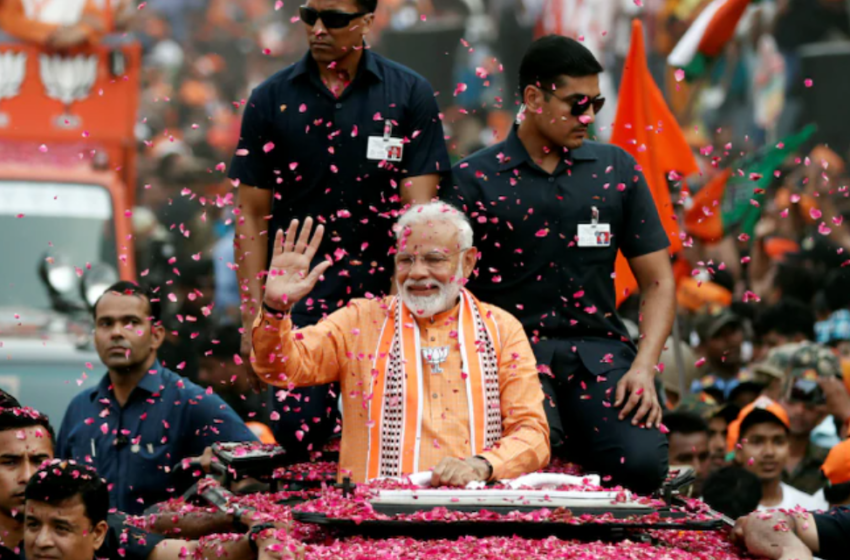As the world’s largest democracy, India is once again in the throes of a monumental event—the Lok Sabha General Elections of 2024.
This grand electoral extravaganza, spanning from 19th April to 1st June, is a colossal exercise in democratic participation, involving the selection of 543 members of the Lok Sabha, the lower house of India’s Parliament.
With nearly 970 million eligible voters out of a population of 1.4 billion, this election marks a historic moment, eclipsing the scale of the 2019 elections and second only to the monumental 1951–52 elections.
Background
In the backdrop of India’s vibrant political landscape, characterized by a multi-party system, two major parties—the Bharatiya Janata Party (BJP) and the Indian National Congress—continue to dominate national politics. Since 2014, the BJP, under the leadership of Prime Minister Narendra Modi, has held power.
With Modi seeking a third consecutive term, the stakes are high in this electoral battle.
Election System
Enshrined in the Constitution of India, elections to the Lok Sabha occur every five years. The electoral process employs the first-past-the-post voting system, where each of the 543 constituencies elects a single member.
Recent amendments to the constitution have abolished reserved seats for the Anglo-Indian community.
Eligible voters must be Indian citizens, at least 18 years old, and registered within their respective constituencies.
The Election Commission of India oversees the electoral process, which strictly prohibits online or postal absentee voting, necessitating physical presence at designated polling stations.
Election Schedule:
The Election Commission of India announced the election schedule on 16th March 2024, marking the commencement of the electoral process.
The tenure of the 17th Lok Sabha is set to conclude on 16th June 2024, paving the way for the formation of the new government based on the outcome of this historic election.
As the countdown to the declaration of results on 4th June 2024 begins, India braces itself for the culmination of a democratic spectacle that underscores the essence of its pluralistic ethos.
With each ballot cast, the voice of the Indian electorate resonates, shaping the destiny of the nation for the years to come.
Date Summary
| Poll Event | Phase | ||||||
| 1 | 2 | 3 | 4 | 5 | 6 | 7 | |
| Notification Date | 20 March | 28 March | 12 April | 18 April | 26 April | 29 April | 7 May |
| Last Date Of Filing Nomination | 27 March | 4 April | 19 April | 25 April | 3 May | 6 May | 14 May |
| Scrutiny Of Nomination | 28 March | 5 April | 20 April | 26 April | 4 May | 7 May | 15 May |
| Last Date For Withdrawal Of Nomination | 30 March | 8 April | 22 April | 29 April | 6 May | 9 May | 17 May |
| Date Of Poll | 19 April | 26 April | 7 May | 13 May | 20 May | 25 May | 1 June |
| Date Of Counting Votes | 4 June 2024 | ||||||
| No. Of Constituencies | 101 ½ | 87 ½ | 95 | 96 | 49 | 57 | 57 |
2024 Lok Sabha Election Schedule
Seat Summary
| State/ Union Territory | Total Constituencies | Election Dates and Number Of Constituencies | ||||||
| Phase 1 | Phase 2 | Phase 3 | Phase 4 | Phase 5 | Phase 6 | Phase 7 | ||
| 19 April | 26 April | 7 May | 13 May | 20 May | 25 May | 1 June | ||
| Andhra Pradesh | 25 | |||||||
| ArunachalPradesh | 2 | 2 | ||||||
| Assam | 14 | 5 | 5 | 4 | ||||
| Bihar | 40 | 4 | 5 | 5 | 5 | 5 | 8 | 8 |
| Chhattisgarh | 11 | 1 | 3 | 7 | ||||
| Goa | 2 | 2 | ||||||
| Gujarat | 26 | 26 | ||||||
| Haryana | 10 | 10 | ||||||
| Himachal Pradesh | 4 | 4 | ||||||
| Jharkhand | 14 | 4 | 3 | 4 | 3 | |||
| Karnataka | 28 | 14 | 14 | |||||
| Kerala | 20 | 20 | ||||||
| Madhya Pradesh | 29 | 6 | 6 | 9 | 8 | |||
| Maharashtra | 48 | 5 | 8 | 11 | 11 | 13 | ||
| Manipur | 2 | 1 ½ | 1 ½ | |||||
| Meghalaya | 2 | 2 | ||||||
| Mizoram | 1 | 1 | ||||||
| Nagaland | 1 | 1 | ||||||
| Odisha | 21 | 4 | 5 | 6 | 6 | |||
| Punjab | 13 | 13 | ||||||
| Rajasthan | 25 | 12 | 13 | |||||
| Sikkim | 1 | 1 | ||||||
| Tamil Nadu | 39 | 39 | ||||||
| Telangana | 17 | 17 | ||||||
| Tripura | 2 | 1 | 1 | |||||
| Uttar Pradesh | 80 | 8 | 8 | 10 | 13 | 14 | 14 | 13 |
| Uttarakhand | 5 | 5 | ||||||
| West Bengal | 42 | 3 | 3 | 4 | 8 | 7 | 8 | 9 |
| Andaman & Nicobar Islands | 1 | 1 | ||||||
| Chandigarh | 1 | 1 | ||||||
| Dadra & Nagar Haveli & Daman & Diu | 2 | 2 | ||||||
| Delhi | 7 | 7 | ||||||
| Jammu And Kashmir | 5 | 1 | 1 | 1 | 1 | 1 | ||
| Ladakh | 1 | 1 | ||||||
| Lakshadweep | 1 | 1 | ||||||
| Puducherry | 1 | 1 | ||||||
| Total Constituencies | 543 | 101 ½ | 87 ½ | 95 | 96 | 49 | 57 | 57 |
| Total Constituencies By End Of Phase | 101 ½ | 189 | 285 | 380 | 429 | 486 | 543 | |
| Percentage Complete By End Of Phase | 18.69 | 34.80 | 52.48 | 69.98 | 79.01 | 89.50 | 100 | |
Phase-Wise Polling Constituencies In Each State
Observers, Voting, and Incidents in the 2024 Lok Sabha General Elections
As the electoral juggernaut of the 2024 Lok Sabha General Elections rolls on in India, the process has been marked by a series of significant events, from international observers to incidents of violence and tragedy.
Observers:
In a bid to enhance transparency and international engagement, the Bharatiya Janata Party (BJP) extended invitations to foreign diplomats stationed in India, as well as to representatives from 25 overseas political parties.
Notable among these were the Conservative and Labour parties of the United Kingdom, the Christian Democratic Union of Germany (CDU), the Social Democratic Party of Germany (SPD), and the Awami League of Bangladesh.
This initiative, part of the “Know BJP” campaign, sought to acquaint external stakeholders with the electoral process. BJP President J. P. Nadda engaged with envoys from 13 countries, fostering diplomatic ties amidst the electoral fervor.
Voting:
The electoral saga unfolded with Phase 1 voting on 19th April 2024, setting the stage for a dynamic electoral journey. However, the process was not without its challenges.
In Inner Manipur, re-polling was necessitated in 11 polling stations due to incidents of violence, underscoring the complexities of ensuring a peaceful electoral process.
Similarly, in Arunachal Pradesh, reports of violence and damage to Electronic Voting Machines (EVMs) prompted re-polling in eight polling stations, highlighting the need for vigilant oversight.
Phase 2 of voting, held on 26th April 2024, witnessed further disruptions. A polling station in Chamarajanagar saw re-polling due to violence and EVM damage, indicative of the persistent challenges in maintaining electoral integrity.
In Outer Manipur, re-polling for six polling stations was ordered following incidents of violence, EVM damage, and allegations of forced voting by unidentified armed individuals, underscoring the imperative of safeguarding the democratic process from external interference.
Incidents:
Amidst the democratic exercise, incidents of violence and tragedy cast a somber shadow.
During Phase 1, clashes erupted outside a polling station in Thamanpokpi, Manipur, while clashes between party workers were reported in West Bengal and Chhattisgarh, resulting in casualties among security personnel and civilians alike.
Phase 2 witnessed further turmoil, with reports of fatalities in Kerala due to heatstroke, and tragic casualties among security personnel in Manipur due to militant attacks. Incidents of EVM vandalism, voter intimidation, and coercion marred the electoral landscape, underscoring the urgent need for robust measures to ensure the safety and sanctity of the electoral process.
Wrapping Up
As India marches forward in its democratic journey, these developments serve as poignant reminders of the formidable challenges inherent in conducting free, fair, and peaceful elections.
Amidst the fervor of political competition, the collective resolve to uphold the democratic ethos remains paramount, echoing the enduring spirit of India’s vibrant democracy.











